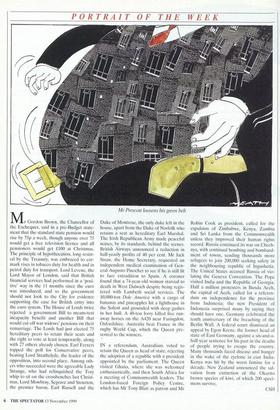PORTRAIT OF THE WEEK
Mr Prescott loosens his green bell
Mr Gordon Brown, the Chancellor of the Exchequer, said in a pre-Budget state- ment that the standard state pension would rise by 75p a week, though anyone over 75 would get a free television licence and all pensioners would get £100 at Christmas. The principle of hypothecation, long resist- ed by the Treasury, was embraced to ear- mark rises in tobacco duty for health and in petrol duty for transport. Lord Levene, the Lord Mayor of London, said that British financial services had performed in a 'posi- tive' way in the 11 months since the euro was introduced, and so the government should not look to the City for evidence supporting the case for British entry into the euro system. The House of Lords twice rejected a government Bill to means-test incapacity benefit and another Bill that would cut off war widows' pensions on their remarriage. The Lords had just elected 75 hereditary peers to retain their seats and the right to vote at least temporarily, along with 27 others already chosen. Earl Ferrers topped the poll for Conservative peers, beating Lord Strathclyde, the leader of the opposition, into second place. Among oth- ers who succeeded were the agreeable Lady Strange, who had relinquished the Tory whip to sit on the crossbenches last Christ- mas, Lord Mowbray, Segrave and Stourton, the premier baron, Earl Russell and the Duke of Montrose, the only duke left in the house, apart from the Duke of Norfolk who retains a seat as hereditary Earl Marshal. The Irish Republican Army made peaceful noises, by its standards, behind the scenes. British Airways announced a reduction in half-yearly profits of 40 per cent. Mr Jack Straw, the Home Secretary, requested an independent medical examination of Gen- eral Augusto Pinochet to see if he is still fit to face extradition to Spain. A coroner found that a 74-year-old woman starved to death in West Dulwich despite being regis- tered with Lambeth social services. The 10,000,ton Dole America with a cargo of bananas and pineapples hit a lighthouse in the Solent and grounded with deep gashes in her hull. A 40-ton lorry killed five run- away horses on the A420 near Faringdon, Oxfordshire. Australia beat France in the rugby World Cup, which the Queen pre- sented to the winners.
IN a referendum, Australians voted to retain the Queen as head of state, rejecting the adoption of a republic with a president appointed by the parliament. The Queen visited Ghana, where she was welcomed enthusiastically, and then South Africa for a meeting of Commonwealth leaders. The London-based Foreign Policy Centre, which has Mr Tony Blair as patron and Mr Robin Cook as president, called for the expulsion of Zimbabwe, Kenya, Zambia and Sri Lanka from the Commonwealth unless they improved their human rights record. Russia continued its war on Chech- nya, with continual bombing and bombard- ment of towns, sending thousands more refugees to join 200,000 seeking safety in the neighbouring republic of Ingushetia. The United States accused Russia of vio- lating the Geneva Convention. The Pope visited India and the Republic of Georgia. Half a million protesters in Banda Acch, the capital of Aceh, called for a referen- dum on independence for the province from Indonesia; the new President of Indonesia surprised many by saying they should have one. Germany celebrated the tenth anniversary of the breaching of the Berlin Wall. A federal court dismissed an appeal by Egon Krenz, the former head of state of East Germany, against a six-and-a- half-year sentence for his part in the deaths of people trying to escape the country. Many thousands faced disease and hunger in the wake of the cyclone in east India. Kenya was hit by the worst famine for a decade. New Zealand announced the sal- vation from extinction of the Okarito brown species of kiwi, of which 200 speci- mens survive.
CSH


























































































 Previous page
Previous page